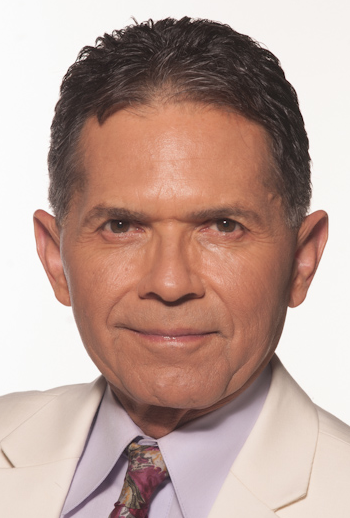Editor’s note: Amigos805 welcomes guest columns, letters to the editor and other submissions from our readers. All opinions expressed in submitted material are those of the author and do not necessarily represent the viewpoint of Amigos805.
By David Magallanes / Guest contributor

David Magallanes
Recently I was trying to explain some mathematical notation to a classroom of college students who wanted to know why I was insisting that it be done that particular way. I didn’t want to say, “Well, that’s just how it’s done,” or, worse yet, “Because I’m the professor!” Either would have sounded crass, it doesn’t sound professional, and students are generally and understandably not happy with those kinds of responses.
But I seem to have come up with the perfect reply that these mostly Latino students instantly comprehend and accept. I tell them, “That’s how we do it in our mathematical family.” They come mostly from homes with some level of Latin American tradition woven into the fabric of their lives. They understand family tradition. They understand that, within reason, we don’t argue with family about doing or not doing the things that are traditionally expected of us, just as our parents, grandparents and ancestors observed and respected the family traditions. Similarly, there are certain traditions in math that are “expected” to be carried out as the problem is solved, or a concept is proven. In too many cases, these students were not made to adhere to these traditions in their earlier school years. So now they are faced with having to learn them and carry on the customs and rituals, some of them developed centuries ago, on their homework and exams.
Why do military veterans snap to attention when the flag passes? Why do Mexicans offer themselves as “servants” to people they encounter—even to strangers—and ask permission to leave upon finishing a conversation? Why are younger prison inmates taught to respect the “veteran prisoners” incarcerated alongside them, those who are considered wiser and with “authority”? Why do Catholics bless themselves with holy water? Why do Asians bow to each other? Why do Muslims turn toward the East to pray? Why do mathematicians present their work vertically, not horizontally, in established patterns?
Simply because that’s how it’s done in these respective families.
— David Magallanes is a writer, speaker and social network marketing consultant. You may visit his web site, dedicated to honoring daughters and keeping them healthy, at www.roses4daughters.com.
You may contact him through e-mail at dmagallanes@roses4daughters.com. Follow us on Facebook (“Like” us!) at www.facebook.com/roses.for.daughters.
***
“Así Es Cómo Se Hace”
Por David Magallanes / Columnista invitado
Hace poco yo andaba tratando de explicar un ejemplo de notación matemática a un grupo de estudiantes en uno de nuestros colegios comunitarios. Querían saber por qué yo estaba insistiendo en que se haga de esa manera particular. Yo no quería decir: “Bueno, eso es sólo cómo se hace”, o, peor aún, “¡Porque soy el profesor!” En cualquier caso, habría sido de mal gusto, suena no muy profesional, que digamos, y a los estudiantes en general, claro que les cae mal ese tipo de respuestas.
Pero me parece que tengo ya la respuesta perfecta que estos estudiantes, en su mayoría latinos, comprenden y aceptan al instante. Les digo: “Así es como lo hacemos en nuestra familia matemática”. Ellos provienen en su mayoría de hogares con algún nivel de tradición latinoamericana en la trama de sus vidas. Comprenden la tradición familiar. Se dan plena cuenta de que, dentro de lo razonable, no discutimos con la familia sobre si hacer o no hacer las cosas que tradicionalmente se esperan de nosotros, al igual que nuestros padres, abuelos y antepasados observaron y respetaron las tradiciones de la familia. Del mismo modo, hay ciertas tradiciones en las matemáticas que se llevan a cabo—por ejemplo, al resolver problemas, o al comprobar algún concepto. En demasiados casos, estos estudiantes no fueron obligados a ejercer estas tradiciones durante sus años escolares anteriores. Así que ahora se enfrentan con la necesidad de aprenderlas y seguir con las costumbres y rituales, algunos de ellos elaborados hace siglos, en sus tareas y exámenes.
¿Por qué los veteranos militares se cuadran cuando la bandera pasa en frente? ¿Por qué los mexicanos se ofrecen como “servidores” a las personas que encuentran, incluso a desconocidos, y piden permiso para despedirse al terminar una conversación? ¿Por qué a los encarcelados más jóvenes se les instruye a respetar a los prisioneros “veteranos” encarcelados junto con ellos, a los que se consideran más prudentes y con “autoridad”? ¿Por qué los católicos se bendicen con agua bendita? ¿Por qué los asiáticos se inclinan el uno hacia el otro? ¿Por qué los musulmanes se dirigen hacia el Oriente para orar? ¿Por qué los matemáticos presentan su trabajo de una manera vertical y no horizontal, según los patrones establecidos?
Simplemente porque así es como se hace en estas familias respectivas.
— David Magallanes es un escritor, orador y consultor de mercadeo por las redes sociales. Usted puede visitar su sitio cibernético, dedicado a la honra y la salud de nuestras hijas, en www.roses4daughters.com.
Se puede comunicar con él por e-mail a: dmagallanes@roses4daughters.com. Síganos en Facebook (“Like”), http://www.facebook.com/roses.for.daughters.
Editor’s note: Amigos805 welcome comments on stories appearing in Amigos805 and on issues impacting the community. Comments must relate directly to stories published in Amigos805, no spam please. We reserve the right to remove or edit comments. Full name, city required. Contact information (telephone, email) will not be published. Please send your comments directly to frank@amigos805.com
